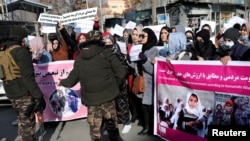ບັນດານັກປົກປ້ອງສິດທິມະນຸດ ໄດ້ກ່າວຫາວ່າ ອຳນາດການປົກຄອງ ຕາລີບານ ໃນອັຟການິສຖານ ພວມແນເປົ້າໃສ່ນັກເຄື່ອນໄຫວສັງຄົມພົນລະເຮືອນ ແລະພະນັກງານສື່ມວນຊົນ ທີ່ວິພາກວິຈານ ຕໍ່ການສະກັດກັ້ນ ການເຂົ້າເຖິງການສຶກສາຂອງແມ່ຍິງ ແລະພື້ນທີ່ສ່ວນໃຫຍ່ ຂອງຊີວິດສາທາລະນະ ຫຼາຍຂື້ນ.
ແຫຼ່ງຂ່າວຂອງສັງຄົມພົນລະເຮືອນອັຟການິສຖານ, ຜູ້ທີ່ບໍ່ຕ້ອງການເປີດເຜີຍຊື່ເນື່ອງຈາກຄວາມກັງວົນດ້ານຄວາມປອດໄພ, ກ່າວວ່າ ການຈັບກຸມ ທ່ານ ມາຕິອຸລລາ ວາຊາ (Matiullah Wesa), ນັກເຄື່ອນໄຫວດ້ານການສຶກສາທີ່ມີຊື່ສຽງ ແລະຜູ້ກໍ່ຕັ້ງເຄືອຂ່າຍສະຫນັບສະຫນູນການສຶກສາຊຸມຊົນ ເພັນແພັທ (PenPath) ໃນອາທິດນີ້, ແມ່ນສ່ວນຫນຶ່ງຂອງການປາບປາມຂະຫນາດໃຫຍ່ໃນປະເທດ.
ແຫຼ່ງຂ່າວຂອງສັງຄົມພົນລະເຮືອນ ແລະອະດີດຜູ້ຖືກຄຸມຂັງ ກ່າວຕໍ່ວີໂອເອວ່າ ເຈົ້າໜ້າທີ່ຂອງກຸ່ມຕາລີບານ ໄດ້ກັກຂັງ "ພະນັກງານຂອງອົງການບໍ່ຂຶ້ນກັບລັດຖະບານ ທີ່ບໍ່ເປັນທີ່ຮູ້ຈັກຫຼາຍ ຫຼາຍຄົນ ໃນຂໍ້ຫາທີ່ໜ້າລັງກຽດ" ໃນຫຼາຍເດືອນທີ່ຜ່ານມາ. ອົງການສືບລັບຂອງກຸ່ມຕາລີບານ, ໜ່ວຍງານບໍລິຫານສືບລັບທົ່ວໄປ, ຫຼື GDI, ແມ່ນເປັນຜູ້ນຳພາການປາບປາມ.
ນັບແຕ່ໄດ້ກັບຄືນມາກຳອຳນາດໃນອັຟການິສຖານໃນປີ 2021, ກຸ່ມຕາລີບານໄດ້ປິດໂຮງຮຽນມັດທະຍົມສຳລັບເດັກຍິງທີ່ເກີນຊັ້ນ ປ.6 ຂື້ນໄປ ແລະເມື່ອບໍ່ດົນມານີ້ໄດ້ໂຈະບໍ່ໃຫ້ນັກຮຽນຍິງເຂົ້າຮຽນຢູ່ມະຫາວິທະຍາໄລ ແລະສະຖາບັນການສຶກສາຊັ້ນສູງອື່ນໆ.
Human rights defenders have alleged that Taliban authorities in Afghanistan are increasingly targeting civil society activists and media workers critical of their curbs on women's access to education and most areas of public life.
Afghan civil society sources, who did not want to be named due to safety concerns, said this week's arrest of Matiullah Wesa, a well-known education activist and founder of the PenPath community-based education support network, is part of a larger crackdown in the country.
The de facto Taliban authorities have detained "many lesser-known non-governmental organization workers on trumped up charges" in recent months, the civil society sources and former detainees told VOA. The Taliban spy agency, the General Directorate of Intelligence, or GDI, is leading the clampdown, the sources said.
Since returning to power in Afghanistan in 2021, the Taliban have closed secondary schools for girls beyond grade six and recently suspended female students from attending universities and other higher education institutions.
Rasul Abdi Parsi, a former Herat University professor, was detained several weeks ago, reportedly over his Facebook posts critical of the hardline rulers.
"With the Taliban's tight restrictions on local media, many other arrests of activists likely go unreported, especially in Afghanistan's more remote provinces," Human Rights Watch said in a statement Thursday, expressing concerns over the crackdown.
The watchdog group lamented that Taliban authorities rarely provide information about reasons for those arrests or when those arrested will be put on trial, if ever.
"Those in custody lack access to lawyers and, in most cases, family members are not even allowed to visit them," the statement said.
Wesa’s relatives said he was picked up on Monday evening outside a mosque after prayers in the capital, Kabul, because he was campaigning against the ban on girls' education.
Taliban chief spokesman Zabihullah Mujahid, confirming Wesa's arrest for the first time on Wednesday, told VOA that the GDI had "some suspicious information" about him that was "a cause of concern" for the government.
Mujahid did not elaborate and defended the official action.
"The government must detain and investigate suspicious people to ensure public order," he said.
On Wednesday, the U.N. High Commissioner for Human Rights office said that a "concerning number of civil society activists" have been detained since early 2023 without clear information about their whereabouts.
The statement identified some Afghan detainees, including Nargis Sadat, Zakaria Osuli, Sultan Ali Ziaee, Khairullah Parhar and Mortaza Behboudi.
Jeremy Laurence, the UNHCR spokesperson, was quoted as describing the ongoing "arbitrary arrests" and detentions as alarming.
"We call for the immediate release of all those arbitrarily detained. … Arrest or detention as punishment for the legitimate exercise of fundamental rights, such as the rights to freedom of opinion and expression, is arbitrary under international human rights law," said Laurence in a statement.
"The Taliban seem to believe that crushing all criticism is the path to political legitimacy. … These arbitrary arrests and detentions are only imperiling Afghanistan's future," said Human Rights Watch.
The international community has refused to formally recognize the Taliban government, citing the treatment of Afghan women, among other human rights concerns.
The radical leaders have rejected calls for removing the bans and instead defend their governance, saying it aligns with their interpretation of Islamic law and Afghan culture.
In an apparent attempt to convey to the world that the Taliban are not ready to reverse their rules for women, they re-issued this week a recent speech of their reclusive chief Hibatullah Akhundzada with English subtitles.
"What do you have to do with what I do, my government, my country, or my principles? Why do you interfere?" the Taliban chief asked. "I will not move even one step with you or interact with you, nor will I engage in a transaction with you at the cost of this Sharia [Islamic law]."




